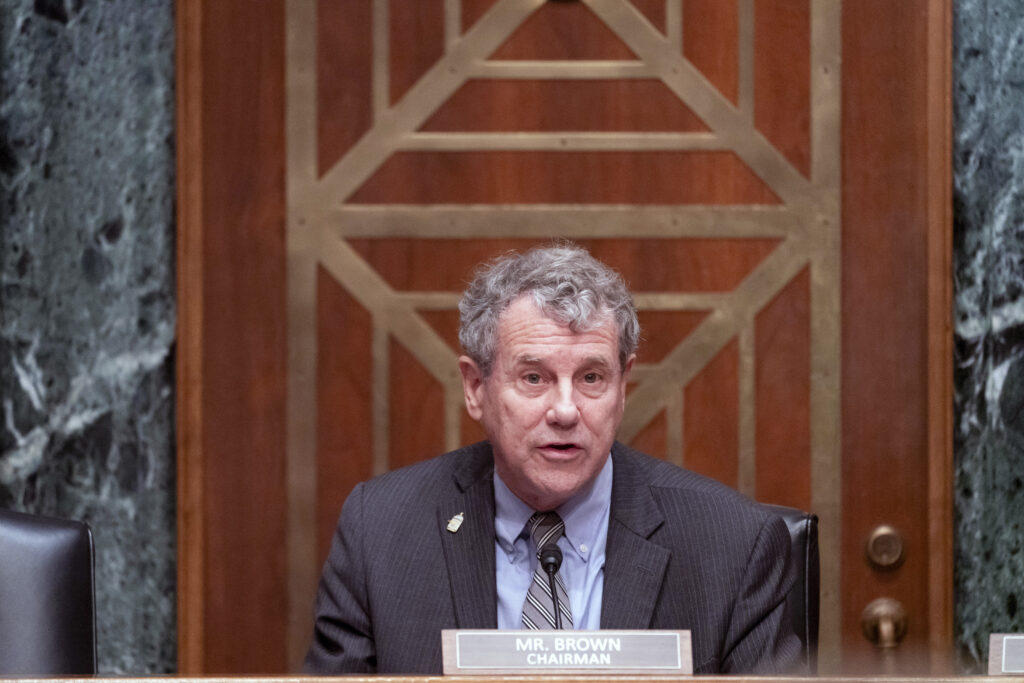
To Sen. Sherrod Brown (D-OH), Big Pharma is jacking up prices for life-saving drugs to enrich its corporate executives. Now, as the Ohio Democrat seeks a fourth term in 2024, he is one of the top recipients of donations among senators from the pharmaceutical industry — including companies being accused in court of inflating the cost of insulin.
Brown’s campaign has accepted more than $1.4 million since 2006 from pharmaceutical companies and employees, with $210,000 of that sum flooding in this current election cycle. His campaign and leadership PAC have also taken hundreds of thousands of dollars in recent years from lobbyists for the industry, according to Federal Election Commission filings. At the same time, Brown positions himself as a staunch foe of Big Pharma, which he blames for price gouging amid record inflation.
“Big Pharma puts profits over patients,” Brown said in April while touting his prior backing of the Inflation Reduction Act, an estimated $1.2 trillion spending package signed into law in 2022 by President Joe Biden. “The purpose of insulin is to save lives, not enrich Big Pharma executives. That’s why we capped insulin costs for Ohioans on Medicare. That’s why we’re working to cap insulin costs for everyone.”
Brown’s willingness to pocket large checks from the pharmaceutical industry will likely open the lawmaker up to hypocrisy accusations as he makes his case to Ohio voters that he’s the right candidate for the Buckeye State’s competitive Senate seat. The Democrat will face off this November against businessman Bernie Moreno, who won a tense GOP primary and was endorsed by former President Donald Trump. The race is a toss-up, according to the Cook Political Report, a nonpartisan elections tracking website.

Since the passage of the Inflation Reduction Act, Brown has done a victory lap on its provision capping insulin prescription costs at $35 per month for enrollees in Medicare Part D. However, right-of-center economics experts argue price controls such as those covered under the law will, in the long-term, lead to shortages and threaten supply, while creating an overly regulated system with burdensome taxes.
Ahead of the 2024 election, Brown is telling Ohio voters he will “keep fighting” to cap insulin prices. He released a campaign ad in April depicting an Ohio resident named Mindy Hedges, a Brown and Biden donor, asserting the senator “stood up to the drug companies” and “cares so much for the people of Ohio.” In February, Brown helped introduce a bill that would direct the Federal Trade Commission and state attorneys general to pursue civil actions against certain corporations deemed to be hiking prices.
But Brown has yet to swear off campaign donations from Big Pharma. He’s accepted almost $60,000 from PACs for corporations that were accused in March in a lawsuit by Philadelphia District Attorney Larry Krasner, a Democrat, of illegally “colluding to inflate the consumer cost of insulin.” Those include CVS and Medco Health, among others.
Meanwhile, the K Street cash keeps flowing to Brown. “Like a river,” said a Republican political strategist aligned with Moreno.
Lobbyists for companies targeted through the Krasner lawsuit and similar lawsuits challenging drug prices have transferred more than $300,000 to Brown’s campaign and leadership PAC, financial disclosures show. That largesse includes $104,000 that lobbyists for UnitedHealth Group, the Minnesota-based healthcare parent company of Optum, donated to the Senate Democrat.
Brown, whose former chief of staff Jay Heimbach lobbied in recent years for Cigna and the drugmaker Amgen, has also accepted around $237,000 from Cardinal Health, McKesson, and AmerisourceBergen PACs, lobbyists, and employees.
The healthcare giants are said to distribute 90% of the drug and medical supplies in the United States and have been sued for allegedly fueling the opioid crisis, a top issue facing Ohio. The trio of companies said in 2022 they would agree to settle opioid-related lawsuits with state and local governments to the tune of roughly $19.5 billion over 18 years.
Brown campaign spokeswoman Reeves Oyster declined to comment to the Washington Examiner on if the senator will swear off or return donations from Big Pharma. She said Brown “continues to fight to lower the cost of medicine for Ohioans and hold Big Pharma accountable for putting profits ahead of people,” pointing to his support of both the Inflation Reduction Act and bipartisan legislation signed by Trump in 2018 aiming to lower drug prices.
Brown holds a 6.7% lead over Moreno among a mix of likely and registered voters, according to polling averages. Outside spending for the Ohio seat has reached $28 million, more than any other race this cycle, while candidates raised $65 million combined through March, the third most.
CLICK HERE TO READ MORE FROM THE WASHINGTON EXAMINER
Brown, according to the Moreno campaign, can’t have it both ways regarding the Big Pharma checks.
“Sherrod Brown is a fraud who talks tough on opposing Big Pharma and big corporations but is happy to have them bankroll his reelection,” said Reagan McCarthy, a spokeswoman for Moreno.







